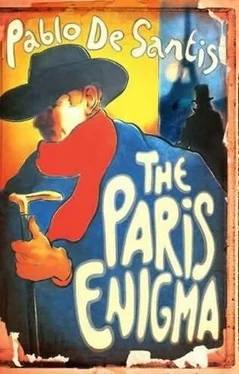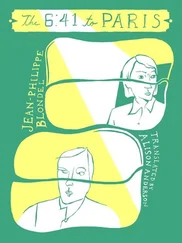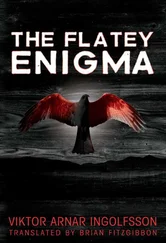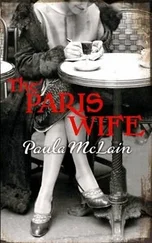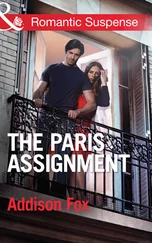Magrelli stood up. Baldone, proud of his detective, nudged me with his elbow, as if to say “here comes the good part.”
“Eight years ago, a series of painting thefts shocked Venice. The important families kept very valuable paintings in their homes, but the thief had consistently chosen minor works that hung in peripheral rooms, rarely used hallways, or servants’ bedrooms, works that were easy to steal. When the thefts continued unabated, I was called in. The owners of the paintings were not as upset about the value of the stolen works as they were about the thief ’s persistence. I consider myself an expert in fine art, but nevertheless, no matter how many times I read the list of stolen works, I couldn’t understand the thief ’s motives. A seascape by an unknown British painter; St. Mark’s Basilica painted by some duke’s uncle, whose intentions were better than his results; the portrait of a bishop whom no one remembered anymore; some goats grazing at dusk… (it’s always dusk in bad paintings). I tried to imagine those works and discover something in them, but I wasn’t making any progress. I couldn’t solve the case until the paintings became invisible to me.”
“They already were invisible-they’d been stolen,” interjected Caleb Lawson.
Magrelli looked at him with annoyance.
“But I had filled my head with descriptions of them and they were hanging in the gallery of my mind. So just as I was able to make myself see them, I stopped seeing them. Renato Craig called this the detective’s blindness, the ability to stop seeing the obvious in order to discover what lies behind it. I stopping paying attention to the descriptions of the paintings and I focused on the frames. Again and again they were ornate moldings, the gold worked with bitumen to make it look aged. All the paintings had been framed by Egidio Vicci, whose work hardly varied. I’ll spare you the details: I soon discovered that Vicci was none other than Cornelio Valgrave, famous forger and art thief. Valgrave had stolen the Tabbia collection ten years earlier: a fatal f law led the police to suspect him. Since he knew that sooner or later they would find him, Valgrave decided to place the stolen pieces behind the bad paintings that arrived in his workshop. Behind the bishop’s face, or the goats, or the Venetian basilica, there was a Giorgione, or a Veronese, or a Titian. When the police had him cornered, the thief turned himself in without revealing where the paintings were hidden. The police searched his house and his friends’ and family’s houses, but they never found anything. When Valgrave got out of prison he hired a band of thieves to recover the booty. I would never have discovered it if I hadn’t reversed my perspective. We always have to do this in order to solve an enigma, remembering Arcimboldo’s repulsive paintings.”
There was a low murmuring, I don’t know if it was approval or confusion. By this point, the assistants who surrounded me were bored, and anxiously awaiting the moment they could go back to their hotel. In my mind I tried to match the assistants with their detectives: Anders Castelvetia’s wasn’t there, and never had been; Benito had taken advantage of a moment’s distraction to disappear; the German, Linker, stood his ground; Baldone, in spite of the devotion that he had shown for his mentor, had chosen an isolated armchair in which to fall asleep.
Madorakis, the Athenian detective, stood up to speak.
“I’d like to thank our good Arzaky for the idea of this symposium,” he said, “but according to the rules, we must have wine. The ancient Greeks would never have dared converse with their throats dry.”
Arzaky gestured and a waiter, who was standing in the doorway, went to get drinks. Madorakis continued, “I have heard people talk about jigsaw puzzles many times, but I have never understood what they had to do with our trade, except in terms of patience, something we strive to have but often don’t. With regard to the paintings of that Milanese artist, I’m not familiar with them. My knowledge of art is limited. But perhaps you will allow me to add an element to our conversation, a venerable image that still has something to tell us: the sphinx.
“Oedipus was our predecessor: he investigated a crime that, unbeknownst to him, he himself was guilty of. That is something we shouldn’t forget: we have an eye for that which is foreign to us, but are blind to the familiar. Let’s leave the crime and the crossroads for a moment and focus on the following scene: Oedipus wants to enter the plague-besieged city to find the sphinx, who offers each of her visitors a riddle, an enigma. What is the creature that walks on four legs in the morning, on two at noon, and on three legs in the evening? Oedipus shrewdly answered, ‘man,’ and in doing so finished off that sphinx. That one, and all the others, because we haven’t heard anything from a sphinx since. We can say that as a man, he was the answer, and would also be the answer to the second enigma, the crime at the crossroads. But let me say something more: the sphinx poses questions, but at the same time she herself is a riddle. We ask questions of enigmas and vice versa. Gentlemen, though we want to live in glass bubbles, to use pure reason, to interrogate witnesses without ever being interrogated, we are always surrounded by questions, and we answer them-subconsciously, through our actions. Through our investigative methods, we show who we are. It is us and not the poets, who aspire to live in ivory towers, but time and time again we come down to earth, and we reveal, without realizing it, our worst secrets.
“Sometime around 1868 a rich merchant was killed in an Athens hotel. He was found in his bed, with a knife from the hotel kitchen in his heart. He had been murdered in the middle of the night, and since no one had entered the hotel at that time, it was assumed that the guilty party was one of the guests. Nothing had been stolen, in spite of the fact that the dead man was quite rich and there were plenty of valuables in his suite. The merchant’s widow immediately contacted me for help. I went around to the hotel, where the Athens police were detaining all the guests. Anyone could easily have gotten into the dead man’s room; the spare key was kept in a drawer in the office. There was no danger that the night watchman would wake up; he slept very soundly and opened his eyes only when a bronze bell was rung. Although any of the hotel guests could have been the killer, none of them had a motive.
“I gave the widow a list of everyone staying in the hotel, to see if she recognized any of the names. A glance was enough for her to tell me that only one of the names was familiar to her: Basilio Hilarion, but she couldn’t remember how she knew him. This Basilio Hilarion had stayed alone in a room on the third f loor. I went to see him. He received me kindly and gave brief, but complete, answers to all my questions. He had been born in Athens, but lived in Thessaloniki; he was an importer of South American tobacco, and his commercial interests didn’t compete with the victim’s. They didn’t live near each other either, so rivalry over a woman was unlikely. He said he’d never met the merchant.
“I went to see the widow and tell her about my interview with Hilarion. She still hadn’t been able to figure out who he was. She showed me a trunk that had been locked for years and held the dead man’s entire past: medals he had won in his youth, family keepsakes, school notebooks, wrinkled letters. It was in an old letter that I found Hilarion’s name.
“They had been classmates. Only a few days after meeting they became inseparable friends. But, when he was thirteen years old, the dead man had seriously offended Hilarion, who had sent him a letter in which he seemed, at once, angry about the friendship ending and truly hurt by it. Shortly after, Hilarion had switched schools and they never saw each other again. I mentioned the incident to the widow and she agreed with me that Hilarion was almost certainly innocent. Who would kill someone over a comment that was made when they were thirteen years old? I left her house empty handed.
Читать дальше
